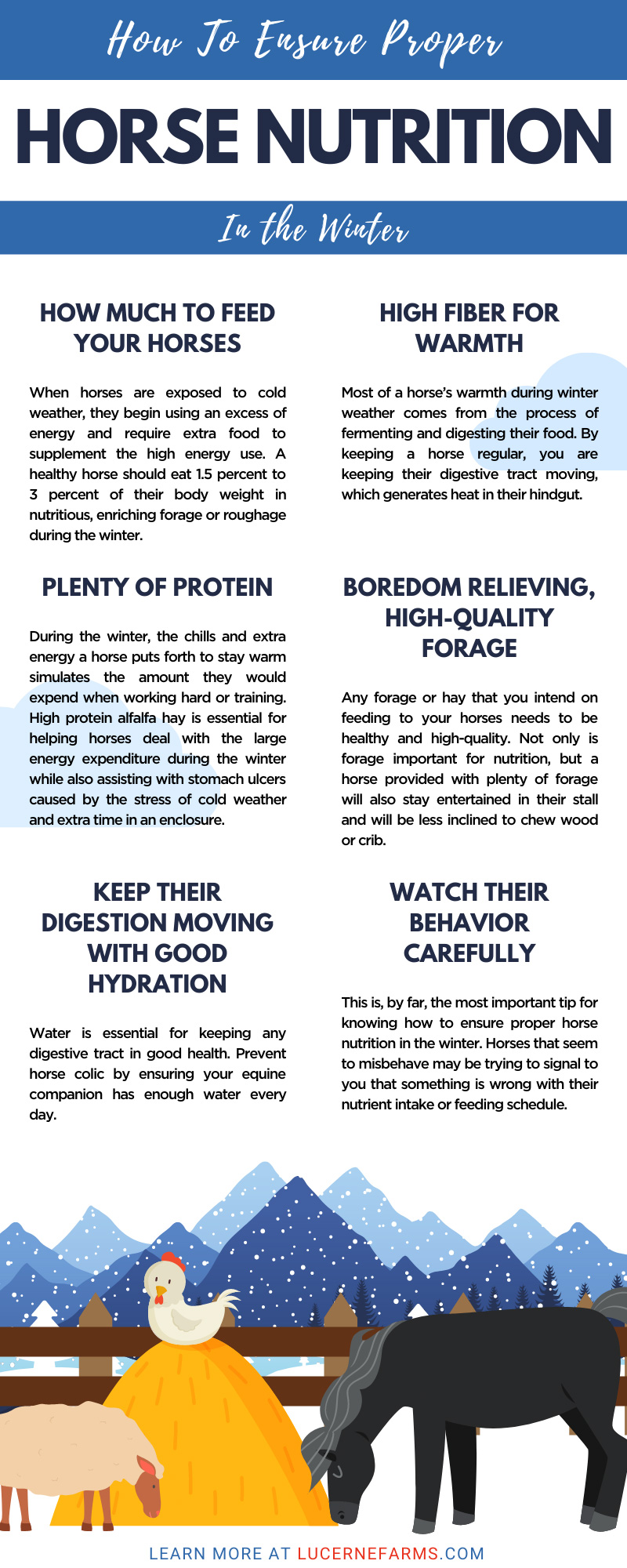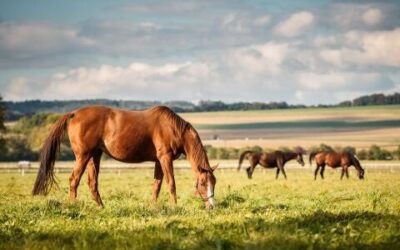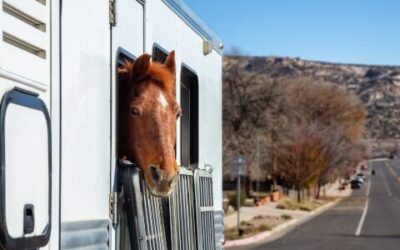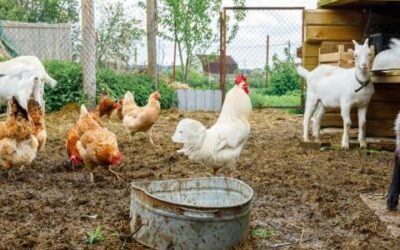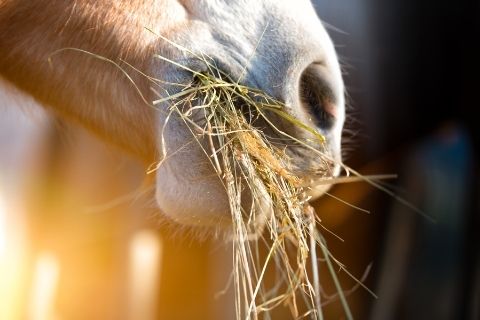
Feeding your horse in the winter can become a challenge as the weather may stress their systems. You may own an easy-going, easy keeper or a high-energy, hard keeper horse that needs more enriching foods to tame bad habits that stem from boredom. Because grazing in the pasture is not an option when the grass is covered in snow, you need to supplement your horses’ diet with nutritious, high-quality forage to help them get that good grass-chewing feeling that they would otherwise get from grazing.
As you dig out your family’s favorite slow cooker soup recipes for long winter evenings, it is essential that you consider how to prepare hearty wintertime meals for your equine friend as well. Prepare yourself for the long winter ahead by knowing how to ensure proper horse nutrition in the winter.
How Much To Feed Your Horses
When horses are exposed to cold weather, they begin using more energy and require extra food to supplement the higher energy useage. A healthy horse should eat 1.5 percent to 3 percent of their body weight in nutritious, enriching forage or roughage during the winter. Depending on how cold the temperatures get or even the strength of the windchill, you may need to tack on a couple of extra pounds of feed to your horse’s daily intake. Easy keepers, though they will still require more forage than normal, will require far less food than hard keepers and likely will not require as much protein. If
your horses stay outside and there is a severe windchill, you may need to provide additional food so they can keep themselves warm and their energy up.
Your horses should have shelter during extreme cold snaps or snowstorms, but in the case that they are not sheltered, you will need to give them far more extra food since they will be wet and cold. Wet hair or fur does not mix well with cold temperatures; it is the same for humans as it is for horses. They will begin shivering and will expend more energy than their body can handle in an effort to keep themselves warm, which can potentially lead to health concerns or even hypothermia in young foals.
What To Feed Your Horses
There are several different ways to supplement nutrition and warmth through food alone during the winter. To ensure your horse stays healthy all winter, it is best that you keep all the following qualities in mind when choosing the best forage for colder temperatures.
High Fiber for Warmth
Most of a horse’s warmth during winter weather comes from the process of fermenting and digesting their food. By feeding horses adequate amounts of forage, you are keeping their digestive tract moving, which generates heat in their hindgut.. Fibrous feed will ensure their gut processes food correctly, creating heat and preventing colic.
Plenty of Protein
Normally, you reserve feed that is high in protein for hard-working horses, brood mares, and foals that are growing every day. During the winter, the chills and extra energy a horse puts forth to stay warm simulates the amount they would expend when working hard or training. High protein alfalfa hay is essential for helping horses deal with the large energy expenditure during the winter while also assisting with stomach ulcers caused by the stress of cold weather and extra time in an enclosure. Lucerne Farms provides horses with our signature blend of alfa hay to keep them energized during the challenging winter months.
Boredom Relieving, High-Quality Forage
Any forage or hay that you intend on feeding to your horses needs to be healthy and high-quality. Not only is forage important for nutrition, but a horse provided with plenty of forage will also stay entertained in their stall or pasture and will be less inclined to chew wood or crib. For the most effect, feed your horses over the course of the entire day rather than all in one meal; this will keep them entertained far longer. Giving your horses something healthy and fibrous to chew on will keep them from slowly tearing apart your barn.
Low-quality forage will not be as effective when it comes to keeping your horses warm and will result in more food waste than necessary. Horses deserve hearty, filling meals of high-quality, high fiber forage that will keep them entertained while they chew. If you notice that their feed supply has become tainted with decay or mold, keep it far away from your horses! To prevent storage issues with forage, ensure the storage location is clean, dry, and free of pests all year long.
Keep Their Digestion Moving With Good Hydration
Water is essential for keeping any digestive tract in good health. Prevent colic by ensuring your equine companion has enough water every day. Horses can be notoriously picky when it comes to water and may turn their nose to icy water. We all know, after all, that you can lead a horse to water but getting them to drink is another story entirely.
To avoid frozen water in the winter, consider picking up a water heater for your buckets. Another thing to watch out for with a horse’s water supply is debris. Dirty water will not only turn your horses’ heads away from hydration but is also unhealthy for them to consume. Clean, free-flowing water is essential for a horse to absorb all the nutrients they need to get through the winter.
Watch Their Behavior Carefully
The only way you will know if your horse is not getting enough nutrients is to keep an eye on how they act. This is, by far, the most important tip for knowing how to ensure proper horse nutrition in the winter. Horses that seem to misbehave may be trying to signal to you that something is wrong with their nutrient intake or feeding schedule. Watch how much they eat and drink, how they are acting, and what their poop looks like. A horse’s health starts in the stomach and gut. Though you may not be able to speak horse, you at least know how gas, bloating, and stomachaches affect your mood. That general sense of empathy will help you connect with your horse and get through the snowy winter.
